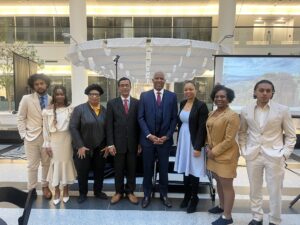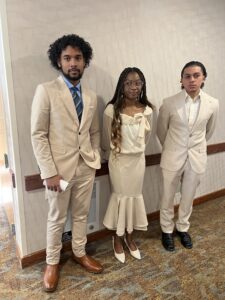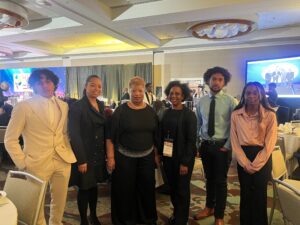Entrepreneurship conference allows Medgar Evers College students to showcase AI-based app pitch
 A contingent of Medgar Evers College students (Anthony Haddaway, Saniyyah Kelly and Thiago Gualpa) were joined by Dr. Patricia Ramsey (third from left), professor Lishawn Alexander (third from right) and Dr. Zulema Blair (second from right) at the HBCU/MI Entrepreneurship & Innovation Conference in Atlanta. (Courtesy photo)
A contingent of Medgar Evers College students (Anthony Haddaway, Saniyyah Kelly and Thiago Gualpa) were joined by Dr. Patricia Ramsey (third from left), professor Lishawn Alexander (third from right) and Dr. Zulema Blair (second from right) at the HBCU/MI Entrepreneurship & Innovation Conference in Atlanta. (Courtesy photo)
By David Gil de Rubio | dgilderubio@mec.cuny.edu
At the recent HBCU/MI Entrepreneurship & Innovation conference recently held at the Westin Atlanta Airport Hotel, a group of Medgar Evers College students had the opportunity to show off their entrepreneurial chops.
With guidance provided by Dr. Zulema Blair, Interim Dean of the School of Business, students Saniyyah Kelly, Anthony Haddaway and Thiago Gualpa had the chance to participate in the HBCU Students’ Business Plan Competition portion of the conference.
Blair was impressed by the opportunity the event provided for these Medgar Evers College students.
“It was an amazing conference,” Blair said. “It aims to assist in developing a comprehensive entrepreneurship curriculum that is particularly relevant in preparing young men and women to develop an entrepreneurial mindset and become leaders and entrepreneurs.”
The mission for the three Medgar Evers College representatives was to pitch E. Teckor LLC, (aka Equalized Technology), a one-stop shop app set up to address and access education, business development, housing and health resources.
For Kelly, who was the lead for her group and is a senior set to graduate with a degree in computer information systems, this app, developed with help from Dr. Blair, is a great user-friendly way of helping underserved communities access resources that might otherwise be seemingly unreachable thanks to mounds of red tape and bureaucracy.

“With what’s happening in the U.S. and the election, we wanted to focus on issues like Medicaid and Social Security getting cut and how it’s all affecting people in our community,” Kelly said. “My team and I were saying that with the age of technology always growing, we wanted to incorporate Artificial Intelligence in a way that affected communities could have a way to actualize these services easily.”
She added, “They don’t have to go through the paperwork. They don’t have to deal with going somewhere and having someone tell them they don’t make this much, so they’re not eligible for something. Or you don’t have this much of a credit score, so you’re not eligible. We wanted to ensure that we address all these issues in one application.”
Haddaway, a junior majoring in financial economics, explained how his group prepped for a month prior, hammering out a PowerPoint presentation that found him presenting the financial aspect of the app. And while he and his teammates were understandably nervous, the experience gave him a shot of confidence for any future endeavors he might want to engage in.
“It was a little awkward because we only had one microphone to use for the three of us, so we had to pass it back and forth to each other,” he recalled. “We kind of messed up a few times, but other than that, I think we did pretty good. And the judges said we did a pretty good job.”
“I thought it was a cool experience. I’ve never done something like this. Personally, I would want to start my own business one day. That’s what I’m interested in doing. Having this experience makes me more comfortable with a business plan, speaking in front of and working with other people. I really got to see what it was all about.”
While Kelly also admitted to having her share of nerves while pitching, the idea of standing before a panel of successful business moguls while seeking funding galvanized her, particularly when the East Flatbush resident had to pivot and field questions.
“I did find it nerve-wracking but also when I was up there in front of them, I did find it a bit inspiring,” Kelly said. “One of the questions I remember being asked was how we would make money when we’re serving neglected and underserved communities. Mind you, these [potential users] most likely deal with poverty and don’t have the money to be using an app to get access to the basic thing they may need as a human being.”
“I said based on how we have revenue projections, we wanted to partner with CUNY institutions and other big corporations/non-profits that fund these communities. We could get funding from them and pass it down. But in order for them to do that, they can also sponsor their programs through our application and then we take a commission from them. That was a question I found to be a really good question. I was proud of how I answered it because I thought I was going to get stuck.”
The three main drivers for the HBCU Entrepreneurship and Innovation program is to have students develop an entrepreneurial mindset to become more effective and successful in the corporate world, become successful entrepreneurs by avoiding costly mistakes and eventually contribute to the generational wealth creation. To that end, the takeaways Kelly and Haddaway wound up learning will be an integral part of their post-collegiate lives.
“When I was participating in the event, I was thinking this was an experience just in case I do advance more into this entrepreneurship thing,” Kelly explained. “I realized I have to network more. Lessons like this can help if I possibly open up my own business one day and then I’ll be able to pitch it even better. This is additional experience — I dipped my toe in the water. That’s how I see it.”
Haddaway added, “If you want to convince people that you have a good idea, you have to be very knowledgeable in every aspect of it, so when people ask you questions, you can answer them so they can understand where you’re coming from. That’s the most important thing — you have to be an expert about whatever you’re talking about. Also, you have to put in a lot of time and effort. The more time and effort you put in, the better the product will be.”
